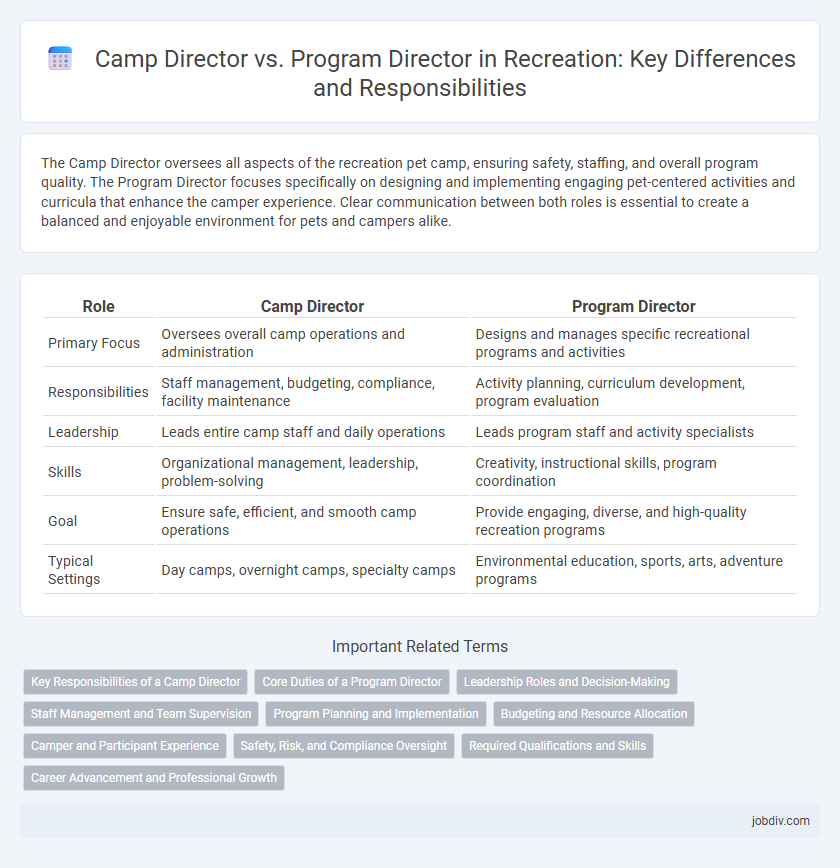The Camp Director oversees all aspects of the recreation pet camp, ensuring safety, staffing, and overall program quality. The Program Director focuses specifically on designing and implementing engaging pet-centered activities and curricula that enhance the camper experience. Clear communication between both roles is essential to create a balanced and enjoyable environment for pets and campers alike.
Table of Comparison
| Role | Camp Director | Program Director |
|---|---|---|
| Primary Focus | Oversees overall camp operations and administration | Designs and manages specific recreational programs and activities |
| Responsibilities | Staff management, budgeting, compliance, facility maintenance | Activity planning, curriculum development, program evaluation |
| Leadership | Leads entire camp staff and daily operations | Leads program staff and activity specialists |
| Skills | Organizational management, leadership, problem-solving | Creativity, instructional skills, program coordination |
| Goal | Ensure safe, efficient, and smooth camp operations | Provide engaging, diverse, and high-quality recreation programs |
| Typical Settings | Day camps, overnight camps, specialty camps | Environmental education, sports, arts, adventure programs |
Key Responsibilities of a Camp Director
A Camp Director is responsible for overseeing all camp operations, including staff management, camper safety, program development, and facility maintenance. They develop policies, ensure compliance with health and safety regulations, and coordinate budgets to maintain smooth camp functioning. Unlike a Program Director who focuses primarily on activity planning, the Camp Director handles broader administrative duties and overall camp leadership.
Core Duties of a Program Director
The core duties of a Program Director in recreation revolve around designing, implementing, and evaluating diverse recreational activities to meet community needs and interests. They manage program budgets, oversee staff training and development, and ensure compliance with safety regulations and organizational goals. Emphasis is placed on creativity, participant engagement, and measuring program effectiveness to enhance overall recreational experiences.
Leadership Roles and Decision-Making
Camp Directors oversee overall camp operations, ensuring safety, staff management, and regulatory compliance, while Program Directors focus on designing and implementing engaging recreational activities tailored to camper interests. Leadership roles differ as Camp Directors make high-level strategic decisions, budget allocations, and policy enforcement, whereas Program Directors concentrate on program development, curriculum planning, and day-to-day activity coordination. Effective decision-making in camp leadership balances administrative oversight with creative program innovation to deliver a safe and enjoyable experience.
Staff Management and Team Supervision
Camp Directors oversee overall staff management by recruiting, training, and evaluating all camp personnel to ensure a safe and engaging environment. Program Directors focus specifically on supervising program staff, coordinating activity schedules, and maintaining quality control over recreational and educational sessions. Both roles require strong leadership skills but differ in scope, with Camp Directors managing the entire team and Program Directors concentrating on program-specific staff supervision.
Program Planning and Implementation
The Camp Director oversees the overall camp operations, while the Program Director specializes in program planning and implementation to ensure engaging and age-appropriate activities. Program Directors design daily schedules, coordinate resources, and evaluate participation outcomes to enhance camper experience. Their expertise in curriculum development and activity management directly impacts the camp's educational and recreational quality.
Budgeting and Resource Allocation
Camp Directors oversee the overall budgeting process, ensuring resources are allocated efficiently across all camp departments to meet operational goals. Program Directors focus specifically on budgeting within their program areas, prioritizing resource allocation for activities, equipment, and staff to enhance participant experiences. Effective collaboration between both roles optimizes financial management and maximizes resource utilization for successful camp operations.
Camper and Participant Experience
Camp Directors shape the overall environment ensuring safety, facility management, and staff training to enhance camper satisfaction. Program Directors design and implement engaging activities tailored to all age groups, directly impacting participant enjoyment and skill development. Together, their roles create a cohesive experience that prioritizes camper engagement and memorable recreational moments.
Safety, Risk, and Compliance Oversight
Camp Directors hold ultimate responsibility for overall safety, risk management, and compliance oversight, ensuring that all camp operations adhere to regulatory standards. Program Directors focus specifically on designing and implementing activities while maintaining safety protocols and risk assessments within their programs. Both roles collaborate closely to uphold a safe environment, with Camp Directors managing legal liabilities and Program Directors addressing day-to-day compliance in recreational activities.
Required Qualifications and Skills
Camp Directors require strong leadership skills, experience in outdoor program management, and certifications such as CPR and first aid, ensuring overall camp safety and operations. Program Directors need expertise in activity planning, curriculum development, and team coordination, often possessing degrees in education or recreation management. Both roles demand excellent communication, problem-solving abilities, and a passion for youth development within recreational settings.
Career Advancement and Professional Growth
Camp Directors oversee the entire camp operation, managing staff, budgeting, and safety protocols, which positions them for executive roles in recreation management. Program Directors specialize in designing and implementing activity schedules, developing skills in leadership and curriculum planning, opening pathways to specialized program development or educational coordination. Both roles foster career advancement through leadership experience, but the Camp Director path offers broader administrative opportunities, while the Program Director path emphasizes expertise in program innovation and participant engagement.
Camp Director vs Program Director Infographic

 jobdiv.com
jobdiv.com